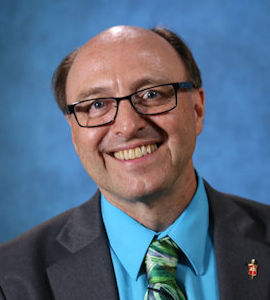Bishop David A. Bard speaks about clay vessels as he announces opportunities to listen and converse, with him and Michigan delegates, around questions and concerns about the 2019 General Conference.
BISHOP DAVID A. BARD
Michigan Area
 First of all, I want to express gratitude to you all for my time away this summer. Thank you for your support and patience. Thanks to my wonderful Executive Assistant, Deana Nelson, for keeping my work organized when I am away, and to my Clergy Assistant, Rev. John Boley, who does superlative work all the time, and is great at keeping things moving forward in my absence.
First of all, I want to express gratitude to you all for my time away this summer. Thank you for your support and patience. Thanks to my wonderful Executive Assistant, Deana Nelson, for keeping my work organized when I am away, and to my Clergy Assistant, Rev. John Boley, who does superlative work all the time, and is great at keeping things moving forward in my absence.
Julie and I traveled to Germany for a wedding reception for our daughter, Beth. Beth married Michael last summer, and Michael is from Germany, so we celebrated their marriage again this year. We traveled to Munich, Munster, Berlin, as well as Michael’s hometown of Marsburg. All three of our children and their significant others were with us on part of the trip. We treasure this time. It will always have a special place in our hearts. I hope you all were able to find time for renewal this summer, whether you traveled near or far or not at all.
Recently I have been reading Second Corinthians. Twice in the fourth chapter, Paul writes, “We do not lose heart.” In between, we are given some clues as to why he might be repeating the phrase. Yes, God’s light shines in our hearts, “but we have this treasure in clay jars,” or, in Eugene Peterson’s rendering in The Message, “the unadorned clay pots of our ordinary lives.” In those lives, we are afflicted though not crushed, perplexed though not despairing, persecuted though not forsaken, struck down though not destroyed. We can probably all relate to Paul’s words, at least sometimes.
There are reasons to lose heart. Fifty years since the death of the Rev. Dr. Martin Luther King, Jr. racism still inhibits the American dream. Inequality has grown while civility had diminished. Deep divisions within our country cloud a vision of the common good. Too many places in the world are at war. Too many children go to bed hungry. Too many people are imprisoned by addiction. Communities and families continue to overcome natural disasters, and here I would thank so many of you who have worked to help others do just that. I am particularly mindful of the terrible flooding this summer in the Keweenaw Peninsula. For too many people, the message of God’s love in Jesus Christ is difficult to hear because the church has not reflected that love, but rather been a place that wounds instead of heals.
“Members of the Michigan delegation to General Conference will be joining me at each location to listen and help respond to your questions and concerns.”
Within our United Methodist Church, the future is uncertain. Decisions to be made at the special called session of the General Conference in St. Louis, February 23-26, 2019 will have wide-ranging impact on how we might continue to live together as a denomination. I will be convening conversations about General Conference 2019 throughout the Conference this fall, and you will find that schedule at the end of this essay. I am delighted to share that members of the Michigan delegation to General Conference will be joining me at each location to listen and help respond to your questions and concerns.
Amid all the discouraging events in our world, amid uncertainty in the church, we hear Paul’s words, “We do not lose heart.” We can, and should, look honestly at our lives and the world and see the struggles and pains and disappointments, yet we do not lose heart. What might that mean? In pondering that question, I identify three dimensions to not losing heart.
To not lose heart is to refuse to give in to our fear and discouragement. This is not a refusal to feel fear and discouragement, it is a refusal to be identified by our fear and discouragement. I often share these words from a treasured essay by Parker Palmer. “Be not afraid does not mean we cannot have fear…. Instead, the words say we do not need to be the fear we have.” (Let Your Life Speak, 93-94) We will have fear, will know it and experience it. We need not be our fear, let it identify us, live primarily out of it. My family and I spent a week in Berlin this summer as we visited the home country of our son-in-law, Michael. It is a beautiful and vibrant city with wonderful museums, a fabulous public transportation system, hundreds of outdoor cafes. Seventy years ago, it was a city recovering from being a battleground. For nearly 30 years it was a city divided by a wall, remnants of which remain, and reminders of which are easily found. To let fear identify us is to forget about human resilience. More importantly, it is to forget about the God of Jesus Christ who is about resurrection and new life.
“God’s light shines in each of us, even in the unadorned clay pots of our ordinary lives.”
To not lose heart means not only transcending our fear, it invites us to live with joy. Joy does not entail ignoring the hard realities. In another of my favorite quotes, the poet Wendell Berry writes, “be joyful, though you’ve considered all the facts.” I recently spent time with Michigan United Methodist pastors at the School for Pastoral Ministry, responding to questions. As you might imagine, many focused on what is happening with The United Methodist Church. Among the things I said were these: “God is not yet done with God’s Church,” and “to have a sense of humor in the midst of struggle and uncertainty is a sign of hope.” Being able to laugh is part of being a non-anxious presence, a crucial quality in leadership. Joy is more than humor, but humor is part of joy. Joy is also being able to wonder, to be curious, to retain the ability to be astonished by beauty.
Finally, I think not losing heart is about being open-hearted and gracious. In these contentious times in the church and in our world, there will be people with whom we profoundly disagree. Can we continue to be open-hearted, seeing others as human beings also loved by God and struggling to work out their faith? Can we see others in the church as persons in whom the light of God shines, even if that light is contained in clay vessels?
We do not lose heart. God is not yet done with God’s church, even if that church might come to look very different. We do not lose heart. God’s light shines in each of us, even in the unadorned clay pots of our ordinary lives. We do not lose heart. There remains beauty, goodness, kindness, the work of justice, peace and reconciliation, and nothing is stronger than love. We do not lose heart. May it be so.
Keeping on with Heart and with You on this Joyful Journey.
Connectional Conversations, II: Listening/Sharing Sessions on A Way Forward
September 25: Marquette: Hope UMC – Connections Campus, 7 p.m.
September 26: St. Ignace UMC, 7 p.m.
October 8: Grayling: Michelson Memorial UMC, 7 p.m.
October 9: Lake Orion UMC, 7 p.m.
October 15: Georgetown UMC, 7 p.m.
October 16: Nardin Park UMC, 7 p.m.
October 17: Kalamazoo: First UMC, 7 p.m.
October 21: Northville UMC, 4 p.m.
October 22: Midland UMC, 7 p.m.
November 29: Ann Arbor, First UMC, 7 p.m.
December 6: Lansing: Area Ministry Center, 7 p.m.
Last Updated on September 21, 2022

